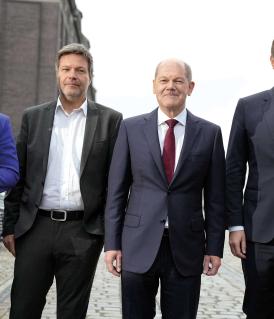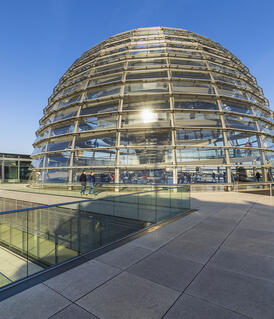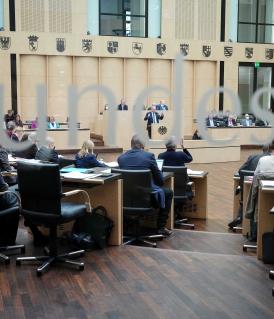Parliament & Parties
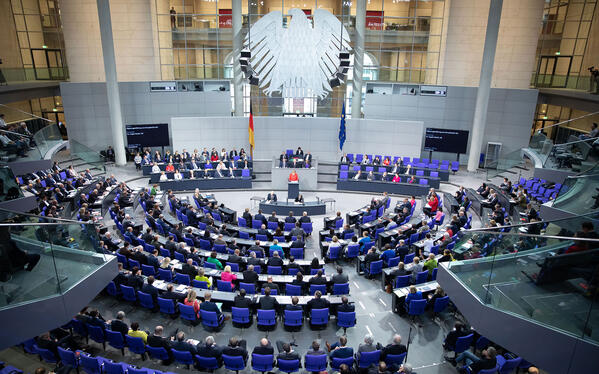
The German Bundestag is elected every four years by all citizens aged 18 and over who have the right to vote, in free, secret and direct elections Elections Every four years, the parties stand in the general elections to the Bundestag. Traditionally, the turn-out is high in Germany, and following a high in the 1970s, when the turn-out was over 90 percent, since reunification it has been around 80 percent. 76.6 per cent of eligible voters took part… Read more › . The Bundestag is the parliament. There are at least 598 seats in the Bundestag The Bundestag The Bundestag is made up of the elected representatives of the German people. In principle elections to the Bundestag are proportionally representative, with each party’s share of the vote in the election reflecting the number of seats it occupies in the parliament. But the electoral system also… Read more › . Of these, half are elected through first votes cast for individuals in 299 constituencies. The rest of the seats are allocated according to second votes from parties' state lists. The electoral system makes it difficult for individual parties to form a government on their own. As such, coalition governments are the rule in Germany. Parties must achieve at least five per cent of the vote (the five per cent hurdle) in order to be represented in the Bundestag. This is to avoid complicating the formation of majorities through the presence of too many smaller parties.
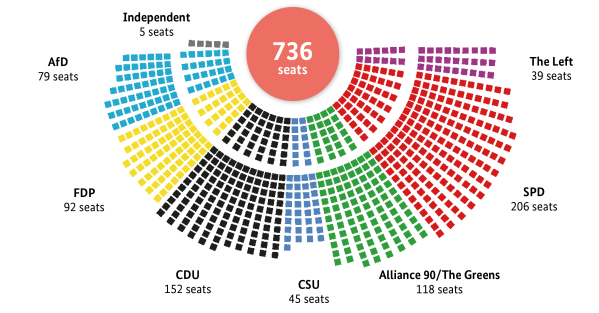
Political parties Political parties According to the Basic Law it is the task of the political parties to participate in political will formation by the people. As such, putting forward candidates for political office and the organization of election campaigns both have the status of constitutional tasks. For this reason the parties… Read more › occupy a prominent position in Germany. They help shape the political decision-making process and are indispensable for democratic elections Elections Every four years, the parties stand in the general elections to the Bundestag. Traditionally, the turn-out is high in Germany, and following a high in the 1970s, when the turn-out was over 90 percent, since reunification it has been around 80 percent. 76.6 per cent of eligible voters took part… Read more › . For this reason, the Basic Law The Basic Law The Basic Law determines that Germany is a constitutional state: All state authorities are subject to judicial control. Section 1 of the Basic Law is of particular relevance. It stipulates that respect for human dignity is the most important aspect of the constitution: “Human dignity shall be… Read more › acknowledges their constitutional status. If a party seeks to eliminate the free democratic basic order of the Federal Republic, the Federal Constitutional Court The Federal Constitutional Court The Federal Constitutional Court is a characteristic institution of post-war German democracy. The Basic Law accorded it the right to repeal legislation passed as part of the legitimate democratic process should it come to the conclusion that such legislation contravenes the Basic Law. The… Read more › may ban that party. However, the barriers to this are very high.
The 20th German Bundestag is made up of 736 representatives of 7 parties: SPD, CDU, CSU, Alliance 90/The Greens, FDP, AfD and The Left. Since the first Bundestag elections in 1949, the CDU have formed a joint party with their sister party the CSU, which only stands for election in Bavaria Bavaria The “beer state” of Bavaria also produces fine wine in the Franconia region. The Oktoberfest, Neuschwanstein Castle and the magnificent Alpine scenery attract more foreign tourists than does any other federal state. Yet the slogan “Laptop and Lederhose” demonstrates that there is more to Bavaria… Read more › .
The present Federal Government Federal Government The Federal Government and cabinet is made up of the Federal Chancellor and the Federal Ministers. While the Chancellor holds the power to issue directives, the ministers have departmental powers, meaning that they independently run their respective ministries in the framework of those directives… Read more › is formed of a coalition of the SPD, Greens and FDP. Olaf Scholz (SPD) is Federal Chancellor Federal chancellor The Federal Chancellor is the only member of the Federal Government to be elected. The constitution empowers him to personally choose his ministers, who head the most important political authorities. Moreover it is the Chancellor who determines the number of ministries and their responsibilities… Read more › , Robert Habeck (Greens) is Vice Chancellor and Annalena Baerbock (Greens) is Federal Foreign Minister. FDP leader Christian Lindner is the Federal Finance Minister. The CDU, CSU, The Left and AfD form the opposition in parliament.
